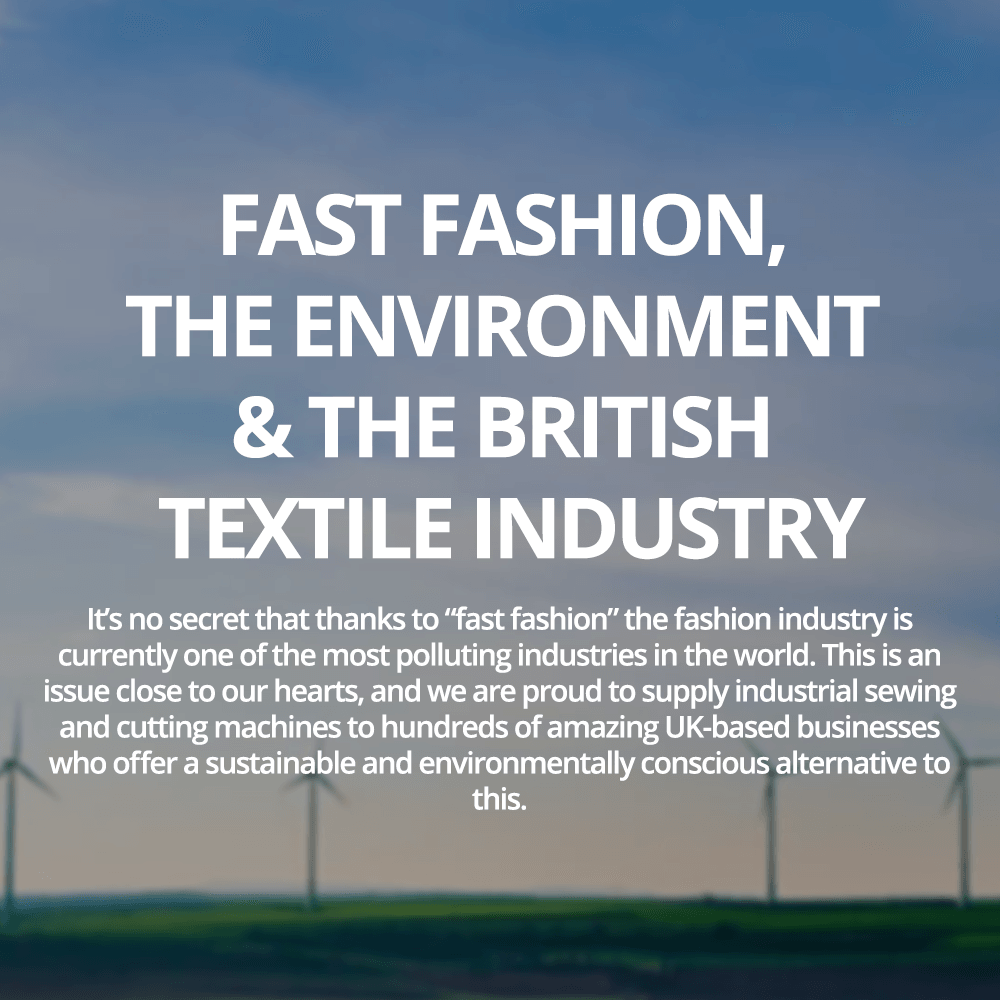Decreasing quality to increase profits is becoming a worrying trend across many industries. In the textile industry, this takes the form of fast fashion. In this week’s article, we discuss the impact of fast fashion and how changing our spending habits to prioritise quality over quantity can help the planet and benefit British businesses. It’s no secret that thanks to “fast fashion” the fashion industry is currently one of the most polluting industries in the world. This is an issue close to our hearts, and we are proud to supply industrial sewing and cutting machines to hundreds of amazing UK-based businesses who offer a sustainable and environmentally conscious alternative to this.

What is fast fashion?
Fast fashion is a trend which has emerged in recent years which has resulted in dramatically increased demand for low-priced clothing. These items are produced as quickly and cheaply as possible to increase profit margins and follow short-term trends. Clothing produced in this way is often worn once, or never, and is not designed to last. Decreased quality and increased consumption is a fatal combination for the global environment. The UK is one of the highest consumers of fast fashion in Europe, but when clothing costs us pennies, the real price is paid elsewhere!
Why is it bad for the environment?
Fast fashion has a negative impact on the environment in many ways throughout the supply chain and the life of the products. As well as carbon emissions from production and transit, wastewater, and chemicals from dyes, unwanted clothing and unsold stock ends up being incinerated or dumped in landfill. According to Greenpeace, textile production emits more C02 into the atmosphere than international flights and shipping combined. 2,625 kilograms, the equivalent of a rubbish truck full of clothes, is burned or thrown into landfill every single second. Many of the items which are dumped are made of materials like polyester which take hundreds of years to decompose.
What can consumers do to change things?
Individuals making small changes to their lifestyle and spending habits can have a huge impact on the industry as a whole. It is important for brands to take action, but consumer behaviour has a powerful influence on the way brands operate. We’ve put together a short list of ways you can make a difference:
* Check that a company’s values match your own before making a purchase. If you are buying clothing online from bigger brands, sites like GoodOnYou, https://goodonyou.eco/ allow you to find out more about the company you are buying from. They rate brands based on 100s of factors, including their environmental impact, labour conditions, and animal welfare policies, before giving them a rating from “great” to “we avoid”. They also suggest alternative brands which have a similar aesthetic and price range but with better ratings, so you can make an informed choice.
* Consider repairing or altering existing items of clothing rather than throwing them away.
* Dispose of unwanted closing responsibly. As well as considering the environment when purchasing clothes, it is important to consider it when disposing of them. Unwanted clothes can be donated, recycled, or even altered and reused to prevent them ending up in landfill.
* Consider purchasing a second-hand, vintage, or upcycled item rather than a new one. Second-hand items available from charity shops or resale websites (often unworn) which are more sustainable and offer an affordable alternative to purchasing new items.
* For a special event, try sites like HURR https://www.hurrcollective.com/ and ByRotation https://byrotation.com/ which allow you to rent designer clothing rather than buying a new item.

What is the alternative to fast fashion going forward?
One of the best alternatives is to shop small wherever possible! We have supplied machines to hundreds of brilliant British businesses who produce high-quality garments which are designed to last. They set an example to larger companies, and the more we support them, the more businesses will start to take sustainability more seriously! Quality pieces from companies who take care with their production process do tend to come with a higher price tag, but often last longer and offer much better long-term and cost-per-wear value than the fast fashion alternatives.
We could fill an entire post with examples (and will do in the future!) but for now we will just mention one:
Usual objections –
Usual Objections make ethical and sustainable swimwear which is designed by swimmers, for swimmers. Their pieces never compromise on quality and are engineered to stand up to lengths in the pool or miles in the open ocean. Usual Objections are committed to being socially positive and environmentally friendly. They are proud members of the 1% for the planet foundation, contributing 1% of their profits to approved charities. Sustainability isn’t just a box-ticking exercise for them, they shun the practices of mass-produced swimwear companies and use carefully sourced fabrics of the highest quality which are designed to last. They provide a lifetime guarantee with their products and offer free repairs to ensure that their swimwear is kept in working order, looking great, and not in landfill!
If you are looking to start upcycling clothes or producing alternatives to fast fashion, our team can help! We can recommend the right machines for your and will deliver them fully built, set up to your requirements, and ready to use! You can get in touch via the contact form on the website or via info@ae-sewingmachines.co.uk
